2021-2022学年人教版新目标英语九年级全册Unit3复习课件(20张PPT)
文档属性
| 名称 | 2021-2022学年人教版新目标英语九年级全册Unit3复习课件(20张PPT) | 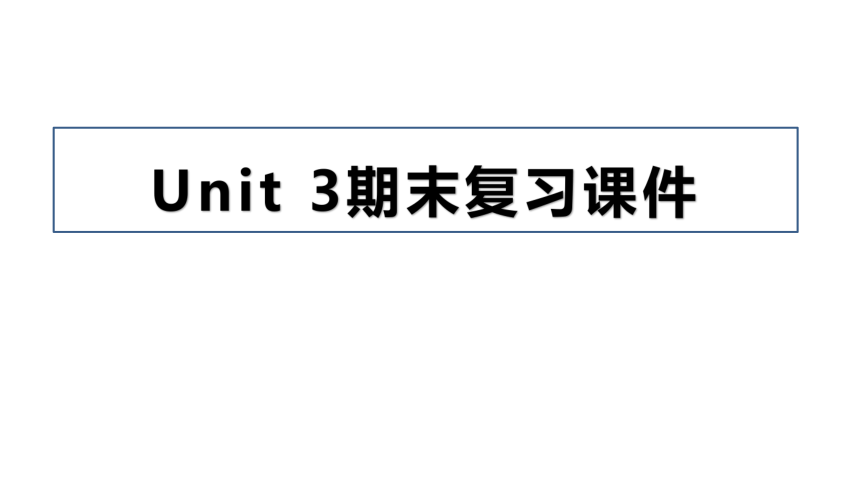 | |
| 格式 | zip | ||
| 文件大小 | 1.2MB | ||
| 资源类型 | 教案 | ||
| 版本资源 | 人教新目标(Go for it)版 | ||
| 科目 | 英语 | ||
| 更新时间 | 2021-10-28 18:08:16 | ||
图片预览

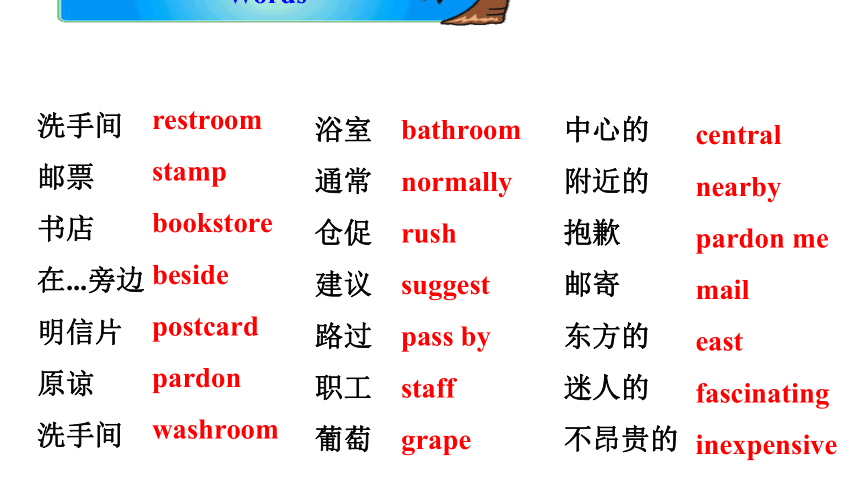
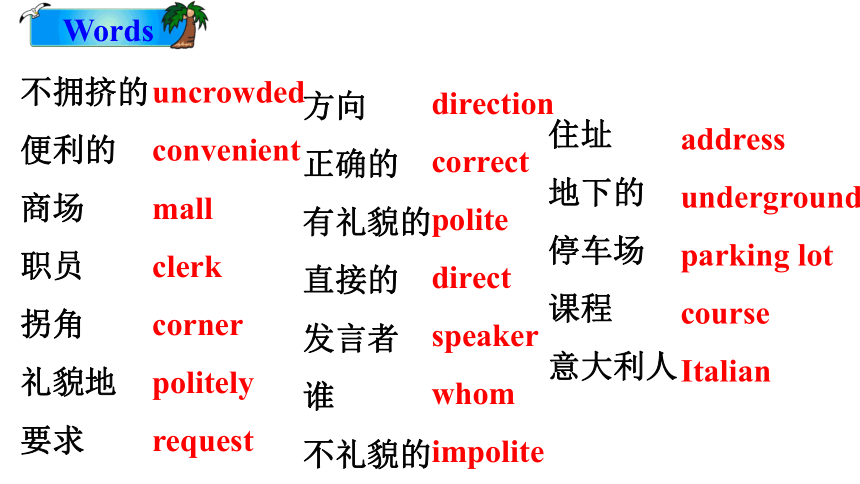
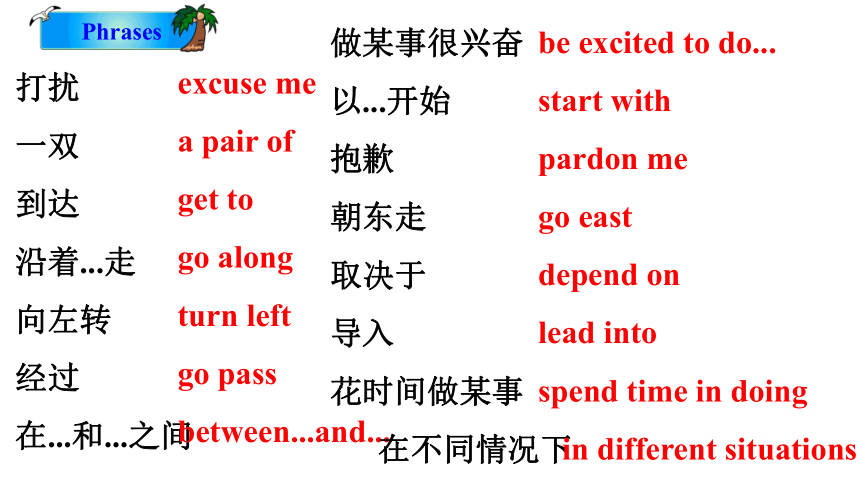
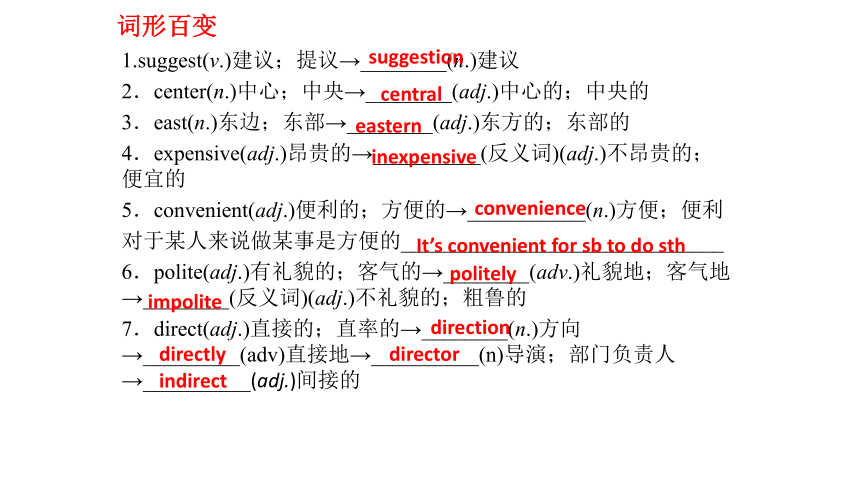
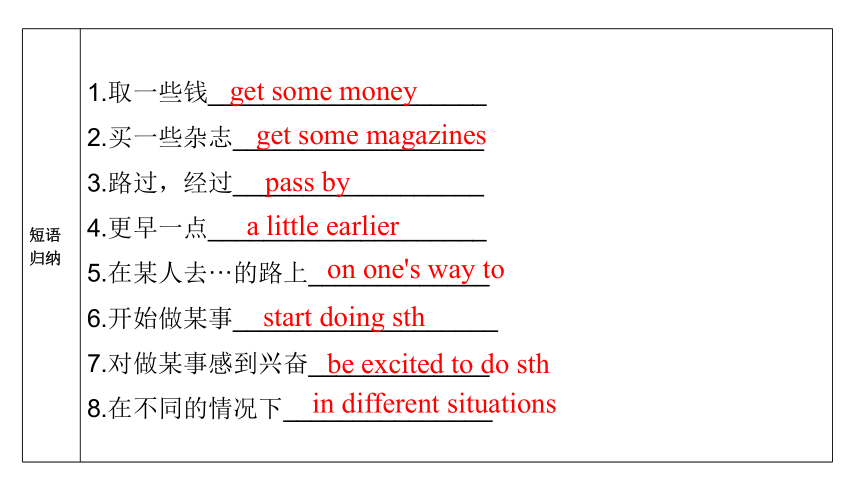
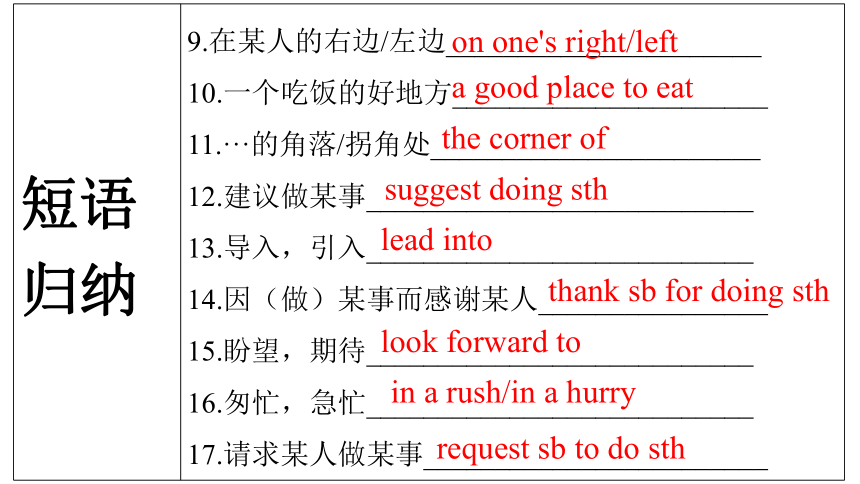
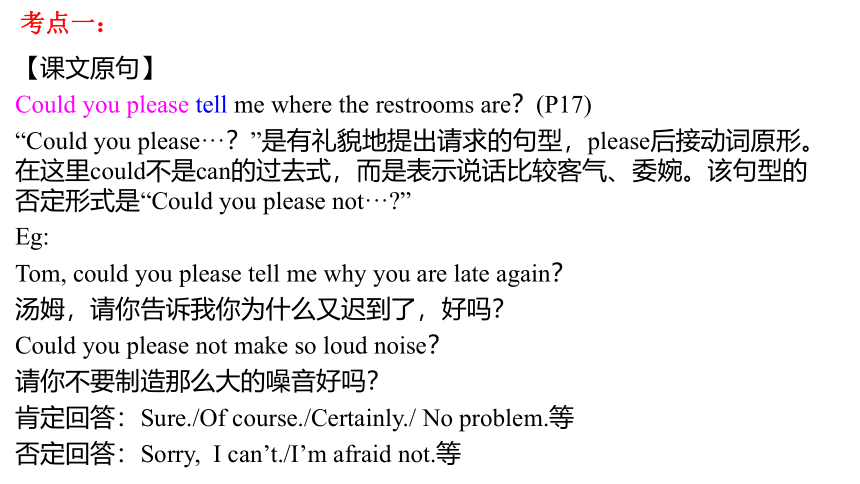
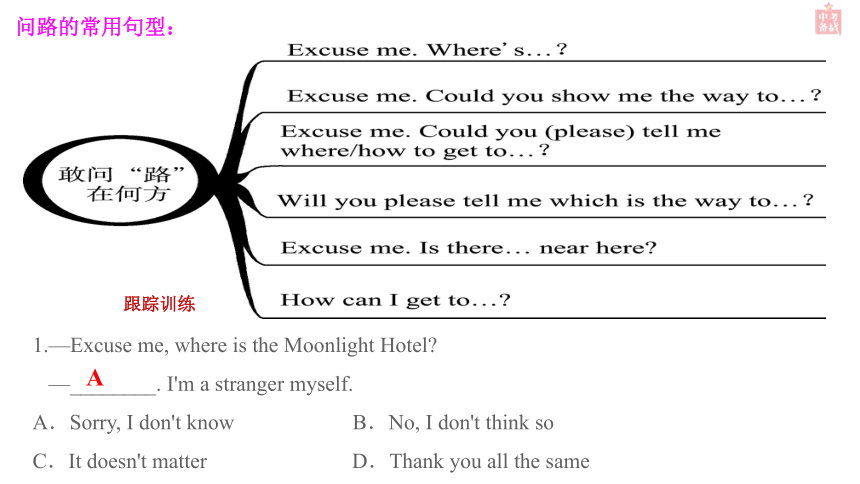
文档简介
(共20张PPT)
Unit 3期末复习课件
Words
洗手间
邮票
书店
在...旁边
明信片
原谅
洗手间
restroom
stamp
bookstore
beside
postcard
pardon
washroom
浴室
通常
仓促
建议
路过
职工
葡萄
bathroom
normally
rush
suggest
pass by
staff
grape
中心的
附近的
抱歉
邮寄
东方的
迷人的
不昂贵的
central
nearby
pardon me
mail
east
fascinating
inexpensive
Words
不拥挤的
便利的
商场
职员
拐角
礼貌地
要求
uncrowded
convenient
mall
clerk
corner
politely
request
方向
正确的
有礼貌的
直接的
发言者
谁
不礼貌的
direction
correct
polite
direct
speaker
whom
impolite
住址
地下的
停车场
课程
意大利人
address
underground
parking lot
course
Italian
Phrases
打扰
一双
到达
沿着...走
向左转
经过
在...和...之间
excuse me
a pair of
get to
go along
turn left
go pass
between...and...
做某事很兴奋
以...开始
抱歉
朝东走
取决于
导入
花时间做某事
在不同情况下
be excited to do...
start with
pardon me
go east
depend on
lead into
spend time in doing
in different situations
词形百变
1.suggest(v.)建议;提议→________(n.)建议
2.center(n.)中心;中央→________(adj.)中心的;中央的
3.east(n.)东边;东部→________(adj.)东方的;东部的
4.expensive(adj.)昂贵的→__________(反义词)(adj.)不昂贵的;便宜的
5.convenient(adj.)便利的;方便的→___________(n.)方便;便利
对于某人来说做某事是方便的______________________________
6.polite(adj.)有礼貌的;客气的→________(adv.)礼貌地;客气地→________(反义词)(adj.)不礼貌的;粗鲁的
7.direct(adj.)直接的;直率的→________(n.)方向→_________(adv)直接地→__________(n)导演;部门负责人→__________(adj.)间接的
suggestion
central
eastern
inexpensive
convenience
politely
impolite
direction
directly
director
indirect
It’s convenient for sb to do sth
短语 归纳 1.取一些钱____________________
2.买一些杂志__________________
3.路过,经过__________________
4.更早一点____________________
5.在某人去···的路上_____________
6.开始做某事___________________
7.对做某事感到兴奋_____________
8.在不同的情况下_______________
get some money
get some magazines
pass by
a little earlier
on one's way to
start doing sth
be excited to do sth
in different situations
短语 归纳 9.在某人的右边/左边______________________
10.一个吃饭的好地方______________________
11.···的角落/拐角处_______________________
12.建议做某事___________________________
13.导入,引入___________________________
14.因(做)某事而感谢某人________________
15.盼望,期待___________________________
16.匆忙,急忙___________________________
17.请求某人做某事________________________
on one's right/left
a good place to eat
the corner of
suggest doing sth
lead into
request sb to do sth
thank sb for doing sth
look forward to
in a rush/in a hurry
考点一:
【课文原句】
Could you please tell me where the restrooms are?(P17)
“Could you please···?”是有礼貌地提出请求的句型,please后接动词原形。在这里could不是can的过去式,而是表示说话比较客气、委婉。该句型的否定形式是“Could you please not··· ”
Eg:
Tom, could you please tell me why you are late again?
汤姆,请你告诉我你为什么又迟到了,好吗?
Could you please not make so loud noise?
请你不要制造那么大的噪音好吗?
肯定回答:Sure./Of course./Certainly./ No problem.等
否定回答:Sorry, I can’t./I’m afraid not.等
问路的常用句型:
跟踪训练
1.—Excuse me, where is the Moonlight Hotel
—________. I'm a stranger myself.
A.Sorry, I don't know B.No, I don't think so
C.It doesn't matter D.Thank you all the same
A
考点二:
【课文原句】
get some information about the town(p17)
information不可数名词,意为“消息;信息”通常不与冠词连用。表示“一条信息”为a piece of information;“两条信息”为two pieces of information。
Eg:
I don't have any information about it.我没有这方面的信息。
【辨析】 information, news与message
考点三:
【课文原句】
Turn left. 向左转。(P18)
turn left=turn to the left。turn此处是不及物动词,意为“转向”。
turn的其他用法
Tom turned and walked away. 汤姆转身走开了。
He turned the key in the lock. 他转动钥匙开锁。
When spring comes, the trees turn green.
当春天来时,树变绿了。
It’s your turn to read now.现在轮到你读了。
(1)作不及物动词,意为“转动,转身”
(2)作及物动词,意为“(使)转动,旋转”
(3)作连系动词,意为“(使)变成,成为”
(4)作名词,意为“轮流”
同类归纳
考点四:
【课文原句】
The supermarket is between the flower store and the bookstore.
between···and···在···和···之间
区分between与among
between介于····(两者)之间
among表示在三者或者三者以上的人或物之间。
Tom is standing among a crowd of children.汤姆站在一群孩子中。
考点五:
【课本原句】
I suggest Water City Restaurant in Water World.(p19)
我建议去水上世界的水城餐馆。
suggest及物动词,意为“建议,提议”,名词形式为suggestion,意为“建议,提议”其用法为:
(1) suggest sth建议做某事
He suggested a walk. 他提议散散步。
(2) suggest doing sth 建议做某事
She suggested going there by bike. 她建议骑自行车去那里。
(3) suggest+that引导的宾语从句,这时宾语从句要用虚拟语气,谓语动词用“(should+)动词原形”。
即suggest+(that)+主语+(should)+do
He suggested (that) we (should) do it at once.
他建议我们立刻做这件事。
考点六:
【课文原句】
You’re always in a rush to get to school on time.
你总是急匆匆地准时到达学校。
Time的相关短语
(1)The man was just ____________(及时)for the bus.
那个人正好赶上那趟车。
(2)I go to school without breakfast ___________(有时)
有时我不吃早饭就去上学。
(3)____________(在····之前)we got to the cinema, the film had begun.
我们到达电影院时,电影已经开始了。
(4)The twins always go to bed __________________(同时)。
双胞胎总是同时上床睡觉。
in time
at times
By the time
at the same time
1.含义:在复合句中用来作宾语的名词性从句。它在句中可以充当动词、介词或者形容词的宾语。
2.构成:谓语动词/介词/形容词+从句(陈述语序)
引导词+主语+谓语动词
I believe you.(宾语)
I believe what you said. (宾语从句)
语序
时态
引导词
【宾语从句】
三大考点
宾语从句
引导词
that(可省略)(陈述句 )
if/whether“是否”(一般疑问句 )
特殊疑问词(特殊疑问句)
时态
主句为一般现在时 从句 任何时态
主句为一般过去时
从句
一般过去时
过去将来时
过去进行时
过去完成时
客观真理 自然现象
公式定理 名言警句 从句 一般现在时
语序
陈述句语序
引导词:
1.陈述句
2.一般疑问句
3.特殊疑问句
that
if /whether
原有的连接代词
和连接副词
1.陈述句充当宾语,由that引导。
I believe (that) we will achieve our dreams in the future.
2.一般疑问句充当宾语,由if/whether引导,“是否”,不能省略与or not 或to do连用。
I asked him whether/if he liked watching TV.
3.特殊疑问句充当宾语,引导词就用原来的特殊疑问词what/where/when/which/why/how...
Do you know how this CD player works
4.当宾语从句中的主语与主句的主语或宾语一致时,可使用“特殊疑问词+动词不定式(短语)” 结构把复合句转换成简单句。如:
I really don’t know which book I should buy.
= I really don’t know which book to buy.
针对性举例
Unit 3期末复习课件
Words
洗手间
邮票
书店
在...旁边
明信片
原谅
洗手间
restroom
stamp
bookstore
beside
postcard
pardon
washroom
浴室
通常
仓促
建议
路过
职工
葡萄
bathroom
normally
rush
suggest
pass by
staff
grape
中心的
附近的
抱歉
邮寄
东方的
迷人的
不昂贵的
central
nearby
pardon me
east
fascinating
inexpensive
Words
不拥挤的
便利的
商场
职员
拐角
礼貌地
要求
uncrowded
convenient
mall
clerk
corner
politely
request
方向
正确的
有礼貌的
直接的
发言者
谁
不礼貌的
direction
correct
polite
direct
speaker
whom
impolite
住址
地下的
停车场
课程
意大利人
address
underground
parking lot
course
Italian
Phrases
打扰
一双
到达
沿着...走
向左转
经过
在...和...之间
excuse me
a pair of
get to
go along
turn left
go pass
between...and...
做某事很兴奋
以...开始
抱歉
朝东走
取决于
导入
花时间做某事
在不同情况下
be excited to do...
start with
pardon me
go east
depend on
lead into
spend time in doing
in different situations
词形百变
1.suggest(v.)建议;提议→________(n.)建议
2.center(n.)中心;中央→________(adj.)中心的;中央的
3.east(n.)东边;东部→________(adj.)东方的;东部的
4.expensive(adj.)昂贵的→__________(反义词)(adj.)不昂贵的;便宜的
5.convenient(adj.)便利的;方便的→___________(n.)方便;便利
对于某人来说做某事是方便的______________________________
6.polite(adj.)有礼貌的;客气的→________(adv.)礼貌地;客气地→________(反义词)(adj.)不礼貌的;粗鲁的
7.direct(adj.)直接的;直率的→________(n.)方向→_________(adv)直接地→__________(n)导演;部门负责人→__________(adj.)间接的
suggestion
central
eastern
inexpensive
convenience
politely
impolite
direction
directly
director
indirect
It’s convenient for sb to do sth
短语 归纳 1.取一些钱____________________
2.买一些杂志__________________
3.路过,经过__________________
4.更早一点____________________
5.在某人去···的路上_____________
6.开始做某事___________________
7.对做某事感到兴奋_____________
8.在不同的情况下_______________
get some money
get some magazines
pass by
a little earlier
on one's way to
start doing sth
be excited to do sth
in different situations
短语 归纳 9.在某人的右边/左边______________________
10.一个吃饭的好地方______________________
11.···的角落/拐角处_______________________
12.建议做某事___________________________
13.导入,引入___________________________
14.因(做)某事而感谢某人________________
15.盼望,期待___________________________
16.匆忙,急忙___________________________
17.请求某人做某事________________________
on one's right/left
a good place to eat
the corner of
suggest doing sth
lead into
request sb to do sth
thank sb for doing sth
look forward to
in a rush/in a hurry
考点一:
【课文原句】
Could you please tell me where the restrooms are?(P17)
“Could you please···?”是有礼貌地提出请求的句型,please后接动词原形。在这里could不是can的过去式,而是表示说话比较客气、委婉。该句型的否定形式是“Could you please not··· ”
Eg:
Tom, could you please tell me why you are late again?
汤姆,请你告诉我你为什么又迟到了,好吗?
Could you please not make so loud noise?
请你不要制造那么大的噪音好吗?
肯定回答:Sure./Of course./Certainly./ No problem.等
否定回答:Sorry, I can’t./I’m afraid not.等
问路的常用句型:
跟踪训练
1.—Excuse me, where is the Moonlight Hotel
—________. I'm a stranger myself.
A.Sorry, I don't know B.No, I don't think so
C.It doesn't matter D.Thank you all the same
A
考点二:
【课文原句】
get some information about the town(p17)
information不可数名词,意为“消息;信息”通常不与冠词连用。表示“一条信息”为a piece of information;“两条信息”为two pieces of information。
Eg:
I don't have any information about it.我没有这方面的信息。
【辨析】 information, news与message
考点三:
【课文原句】
Turn left. 向左转。(P18)
turn left=turn to the left。turn此处是不及物动词,意为“转向”。
turn的其他用法
Tom turned and walked away. 汤姆转身走开了。
He turned the key in the lock. 他转动钥匙开锁。
When spring comes, the trees turn green.
当春天来时,树变绿了。
It’s your turn to read now.现在轮到你读了。
(1)作不及物动词,意为“转动,转身”
(2)作及物动词,意为“(使)转动,旋转”
(3)作连系动词,意为“(使)变成,成为”
(4)作名词,意为“轮流”
同类归纳
考点四:
【课文原句】
The supermarket is between the flower store and the bookstore.
between···and···在···和···之间
区分between与among
between介于····(两者)之间
among表示在三者或者三者以上的人或物之间。
Tom is standing among a crowd of children.汤姆站在一群孩子中。
考点五:
【课本原句】
I suggest Water City Restaurant in Water World.(p19)
我建议去水上世界的水城餐馆。
suggest及物动词,意为“建议,提议”,名词形式为suggestion,意为“建议,提议”其用法为:
(1) suggest sth建议做某事
He suggested a walk. 他提议散散步。
(2) suggest doing sth 建议做某事
She suggested going there by bike. 她建议骑自行车去那里。
(3) suggest+that引导的宾语从句,这时宾语从句要用虚拟语气,谓语动词用“(should+)动词原形”。
即suggest+(that)+主语+(should)+do
He suggested (that) we (should) do it at once.
他建议我们立刻做这件事。
考点六:
【课文原句】
You’re always in a rush to get to school on time.
你总是急匆匆地准时到达学校。
Time的相关短语
(1)The man was just ____________(及时)for the bus.
那个人正好赶上那趟车。
(2)I go to school without breakfast ___________(有时)
有时我不吃早饭就去上学。
(3)____________(在····之前)we got to the cinema, the film had begun.
我们到达电影院时,电影已经开始了。
(4)The twins always go to bed __________________(同时)。
双胞胎总是同时上床睡觉。
in time
at times
By the time
at the same time
1.含义:在复合句中用来作宾语的名词性从句。它在句中可以充当动词、介词或者形容词的宾语。
2.构成:谓语动词/介词/形容词+从句(陈述语序)
引导词+主语+谓语动词
I believe you.(宾语)
I believe what you said. (宾语从句)
语序
时态
引导词
【宾语从句】
三大考点
宾语从句
引导词
that(可省略)(陈述句 )
if/whether“是否”(一般疑问句 )
特殊疑问词(特殊疑问句)
时态
主句为一般现在时 从句 任何时态
主句为一般过去时
从句
一般过去时
过去将来时
过去进行时
过去完成时
客观真理 自然现象
公式定理 名言警句 从句 一般现在时
语序
陈述句语序
引导词:
1.陈述句
2.一般疑问句
3.特殊疑问句
that
if /whether
原有的连接代词
和连接副词
1.陈述句充当宾语,由that引导。
I believe (that) we will achieve our dreams in the future.
2.一般疑问句充当宾语,由if/whether引导,“是否”,不能省略与or not 或to do连用。
I asked him whether/if he liked watching TV.
3.特殊疑问句充当宾语,引导词就用原来的特殊疑问词what/where/when/which/why/how...
Do you know how this CD player works
4.当宾语从句中的主语与主句的主语或宾语一致时,可使用“特殊疑问词+动词不定式(短语)” 结构把复合句转换成简单句。如:
I really don’t know which book I should buy.
= I really don’t know which book to buy.
针对性举例
同课章节目录
- Unit 1 How can we become good learners.
- Section A
- Section B
- Unit 2 I think that mooncakes are delicious!
- Section A
- Section B
- Unit 3 Could you please tell me where the restroom
- Section A
- Section B
- Unit 4 I used to be afraid of the dark.
- Section A
- Section B
- Unit 5 What are the shirts made of?
- Section A
- Section B
- Review of Units 1-5
- Unit 6 When was it invented?
- Section A
- Section B
- Unit 7 Teenagers should be allowed to choose their
- Section A
- Section B
- Unit 8 It must belong to Carla.
- Section A
- Section B
- Unit 9 I like music that I can dance to.
- Section A
- Section B
- Unit 10 You're supposed to shake hands.
- Section A
- Section B
- Review of Units 6-10
- Unit 11 Sad movies make me cry.
- Section A
- Section B
- Unit 12 Life is full of the unexpected
- Section A
- Section B
- Unit 13 We're trying to save the earth!
- Section A
- Section B
- Unit 14 I remember meeting all of you in Grade 7.
- Section A
- Section B
- Review of Units 11-14
